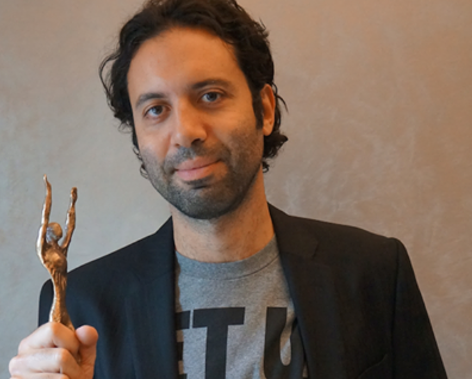Italian film director, Lucio de Candia, won the International Active Nonviolence Film Festival (FICNOVA) prize for Balkan Blues in 2016, and taking advantage of his participation in the 2018 European Humanist Forum in Madrid, we asked him about the role of images in the humanising transformation of human beings.
EHF2018: You will participate in the European Humanist Forum 2018 in the area “Images as a tool for change”… Without a doubt, images are fundamental elements of this historical moment. How do you see their role in producing changes?
LDC: In this period social media, tv and web channels have a huge role in conditioning people’s minds (mainly the younger generation) and people, when unaware, are persuaded in an unconscious way to make choices and behave in a certain way. It’s the same mechanism as advertising… but while advertising has the aim to sell products, new technologies influence the way we think as a whole; but images can be used in a constructive way when they aim to create awareness because international society needs a change (in economics, politics, human rights, environment) and only a minority of people want to preserve the “status quo” for their selfish purposes.
Perhaps cinema can produce psychosocial changes. Does this work transform you as a director, in this case?
Yes, psychosocial changes are the effects of awareness. Cinema is a powerful instrument for reflection because it can show stories that rarely find visibility in mainstream programming. Before starting work I’m aware of what I want to say… of course something can happen when unexpected situations occur… then you can find new emotions that you want to somehow show to the public. In addition, when you are more involved in the story – for example after the interviews in a documentary – it’s easier to see the unperceived mechanisms that are necessary to understand in order to fight for an improvement of society. Unfortunately powerful people control the media in every country and the challenge is “how to reach to a higher audience”.
You received the FICNOVA prize for Balkan Blues, what feedback have you had since the premiere and the subsequent path that the documentary has followed? How could this have influenced ?
The first thing that surprised me was that a lot of people didn’t know anything about the wars in former Yugoslavia despite the fact that it was just on the other coast of the Mediterranean. The media talk about historical facts but they just “burn” news… They rarely analyze events and are soon ready to distract the public again. I’m very happy because Balkan Blues stimulated reflection and created emotions in the public. Of course I was glad also to receive the award because it’s a recognition for hard work and professionalism.
How can cinema, and images in general, help to open or strengthen the paths that lead us to a brotherly planet, to a single humanity?
The Humanist Forum and independent film festivals are tangible examples of what can be done. But it is also important to make producers and enterpreneurs, in general, aware of the importance of themes such as peace and pluralism for example. The biggest challenge is to make polititcians aware because they usually hold the strings of power.
What elements, you think, can help unite us on that path?
Working together and think about new ideas to involve a lot of people in this attempt.










